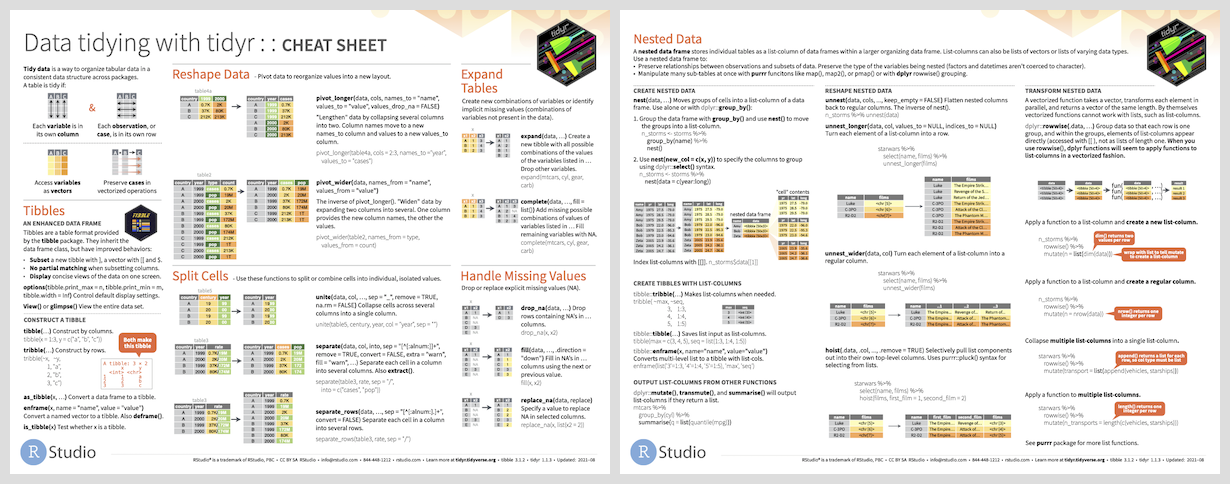https://github.com/tidyverse/tidyr
Tidy Messy Data
https://github.com/tidyverse/tidyr
r tidy-data
Last synced: 6 months ago
JSON representation
Tidy Messy Data
- Host: GitHub
- URL: https://github.com/tidyverse/tidyr
- Owner: tidyverse
- License: other
- Created: 2014-06-10T14:24:33.000Z (over 11 years ago)
- Default Branch: main
- Last Pushed: 2025-03-03T19:50:08.000Z (9 months ago)
- Last Synced: 2025-05-03T02:13:39.341Z (7 months ago)
- Topics: r, tidy-data
- Language: R
- Homepage: https://tidyr.tidyverse.org/
- Size: 19.7 MB
- Stars: 1,394
- Watchers: 70
- Forks: 415
- Open Issues: 55
-
Metadata Files:
- Readme: README.Rmd
- Changelog: NEWS.md
- Contributing: .github/CONTRIBUTING.md
- License: LICENSE
- Code of conduct: .github/CODE_OF_CONDUCT.md
- Codeowners: .github/CODEOWNERS
- Support: .github/SUPPORT.md
Awesome Lists containing this project
- Road2R - tidyr - Easily Tidy Data with 'spread()' and 'gather()' Functions. (Table of Contents / Data manipulation)
- jimsghstars - tidyverse/tidyr - Tidy Messy Data (R)
- awesome-starred - tidyr - Easily tidy data with spread and gather functions. (R)
README
---
output: github_document
---
```{r, echo = FALSE}
knitr::opts_chunk$set(
collapse = TRUE,
comment = "#>",
fig.path = "README-"
)
```
[](https://cran.r-project.org/package=tidyr)
[](https://github.com/tidyverse/tidyr/actions/workflows/R-CMD-check.yaml)
[](https://app.codecov.io/gh/tidyverse/tidyr?branch=main)
## Overview
The goal of tidyr is to help you create __tidy data__. Tidy data is data where:
1. Each variable is a column; each column is a variable.
1. Each observation is a row; each row is an observation.
1. Each value is a cell; each cell is a single value.
Tidy data describes a standard way of storing data that is used wherever possible throughout the [tidyverse](https://www.tidyverse.org/). If you ensure that your data is tidy, you'll spend less time fighting with the tools and more time working on your analysis. Learn more about tidy data in `vignette("tidy-data")`.
## Installation
```{r, eval = FALSE}
# The easiest way to get tidyr is to install the whole tidyverse:
install.packages("tidyverse")
# Alternatively, install just tidyr:
install.packages("tidyr")
# Or the development version from GitHub:
# install.packages("pak")
pak::pak("tidyverse/tidyr")
```
## Cheatsheet
## Getting started
```{r}
library(tidyr)
```
tidyr functions fall into five main categories:
* "Pivoting" which converts between long and wide forms. tidyr 1.0.0
introduces `pivot_longer()` and `pivot_wider()`, replacing the older
`spread()` and `gather()` functions. See `vignette("pivot")` for more
details.
* "Rectangling", which turns deeply nested lists (as from JSON) into tidy
tibbles. See `unnest_longer()`, `unnest_wider()`, `hoist()`, and
`vignette("rectangle")` for more details.
* Nesting converts grouped data to a form where each group becomes a
single row containing a nested data frame, and unnesting does the opposite.
See `nest()`, `unnest()`, and `vignette("nest")` for more details.
* Splitting and combining character columns. Use `separate_wider_delim()`,
`separate_wider_position()`, and `separate_wider_regex()` to pull a single
character column into multiple columns; use `unite()` to combine multiple
columns into a single character column.
* Make implicit missing values explicit with `complete()`; make explicit
missing values implicit with `drop_na()`; replace missing values with
next/previous value with `fill()`, or a known value with `replace_na()`.
## Related work
tidyr [supersedes](https://lifecycle.r-lib.org/articles/stages.html#superseded) reshape2 (2010-2014) and reshape (2005-2010). Somewhat counterintuitively, each iteration of the package has done less. tidyr is designed specifically for tidying data, not general reshaping (reshape2), or the general aggregation (reshape).
[data.table](https://rdatatable.gitlab.io/data.table) provides high-performance implementations of `melt()` and `dcast()`
If you'd like to read more about data reshaping from a CS perspective, I'd recommend the following three papers:
* [Wrangler: Interactive visual specification of data transformation scripts](http://vis.stanford.edu/papers/wrangler)
* [An interactive framework for data cleaning](https://www2.eecs.berkeley.edu/Pubs/TechRpts/2000/CSD-00-1110.pdf) (Potter's wheel)
* [On efficiently implementing SchemaSQL on a SQL database system](https://www.vldb.org/conf/1999/P45.pdf)
To guide your reading, here's a translation between the terminology used in different places:
| tidyr 1.0.0 | pivot longer | pivot wider |
|-------------------|--------------|-------------|
| tidyr < 1.0.0 | gather | spread |
| reshape(2) | melt | cast |
| spreadsheets | unpivot | pivot |
| databases | fold | unfold |
## Getting help
If you encounter a clear bug, please file a minimal reproducible example on [github](https://github.com/tidyverse/tidyr/issues). For questions and other discussion, please use [forum.posit.co](https://forum.posit.co/).
---
Please note that the tidyr project is released with a [Contributor Code of Conduct](https://tidyr.tidyverse.org/CODE_OF_CONDUCT.html). By contributing to this project, you agree to abide by its terms.

